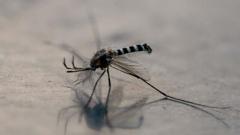After at least 34 deaths from yellow fever, Colombia has declared a health emergency, urging vaccinations among citizens ahead of holiday travel. The outbreak marks a significant rise in cases compared to previous years, prompting heightened vigilance.
Colombia Faces Yellow Fever Crisis with Nationwide Health Emergency

Colombia Faces Yellow Fever Crisis with Nationwide Health Emergency
With mounting fatalities from yellow fever, Colombia's government enforces vaccination guidelines as it battles an urgent health crisis.
Colombia has officially declared a nationwide health emergency following a tragic outbreak of yellow fever, resulting in at least 34 fatalities, based on government reports. This disease, caused by a virus transmitted through infected mosquitoes, has seen an alarming increase in cases, which reached 74 confirmed instances during this outbreak, contrasting sharply with only two cases in 2023 and none reported from 2019 to 2022.
Health Minister Guillermo Alfonso Jaramillo emphasized the necessity of vaccinations, especially as the Easter weekend approaches, a time when many Colombians venture into regions where mosquitoes are prevalent. Individuals traveling to high-risk areas will now be required to present proof of vaccination, which is available for free throughout the country.
The severity of this outbreak has raised concerns, with the health minister noting a nearly 50% mortality rate among those infected. The majority of reported yellow fever cases are concentrated in Tolima province, an area famous for its coffee plantations and tourist appeal.
Colombian President Gustavo Petro has issued a warning on social media, advising those who have not been vaccinated to avoid high-risk areas, particularly during the upcoming holiday. Diagnosing yellow fever can be a challenge, as its symptoms can mimic various other illnesses, leading to potential misdiagnosis.
According to the World Health Organisation (WHO), while most individuals recover from the initial infection phase characterized by general flu-like symptoms, about 15% can progress to a critical phase involving severe symptoms such as high fever and jaundice. The WHO warns that half of those who enter this toxic stage may succumb within 10 to 14 days. As a response, the Colombian government is prioritizing public health initiatives to combat the crisis effectively.



















